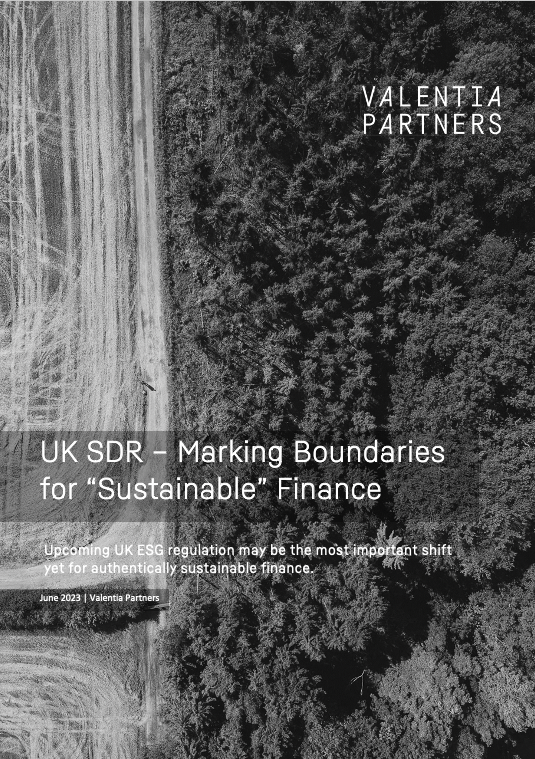UK SDR – Marking Boundaries for “Sustainable” Finance
Upcoming UK ESG regulation may be the most important shift yet for authentically sustainable finance.
Downloads
Authors
Marking Boundaries for “Sustainable” Finance
The Financial Conduct Authority will publish the Sustainability Disclosure Requirements (SDR) and Investment labels final policy paper in Q3 2023. The regulatory approach looks to put clear air between financial products that authentically prioritise sustainability and those that don’t.
In 2004 the UN publication 'Who Cares Wins' carried what is widely considered to be the first reference to 'ESG'. Since then the Environmental, Social and Governance (ESG) investment landscape has undergone substantial growth and evolution. With heightened awareness of climate change and social issues, investors have embraced the importance of integrating ESG factors into their investment decisions. Global sustainable investment hit $35.3 trillion in 2020, a 15% rise compared to 2018 (Alliance 2020).
““Our proposals aim to build transparency and trust by introducing labels to help consumers navigate the market for sustainable investment products”.”
The rise in demand has led to a wide variety of investment products focusing on environmental, social, and governance (ESG) factors, including green bonds and sustainable funds. Companies and financial institutions have built up ESG practices, with over 90% of S&P 500 companies publishing sustainability reports as of 2020 (Institute 2021). Regulators and standard-setting organisations have also played a crucial role by developing guidelines and frameworks, such as the Task Force on Climate-related Financial Disclosures (TFCD), the Global Reporting Initiative (GRI) and Principles for Responsible Investment (PRI), which aim to enhance transparency and consistency in ESG reporting, enable better decision making, and encourage sustainable business practices worldwide. Evidently, the ESG investment landscape has expanded dramatically, providing investors with an extensive array of opportunities to align their financial goals with sustainable and responsible practices. Or has it?
Why are the rules being introduced?
The Financial Conduct Authority (FCA) is introducing a new regulation, the Sustainability Disclosure Requirements (SDR) to address the risk of "greenwashing" and enhance transparency in sustainable investments. Greenwashing refers to misleading or exaggerated claims made by companies regarding the environmental benefits of their products or services. Greenwashing arises from the commercial incentive to offer 'green' products.
Whilst greenwashing is sometimes unscrupulous and deliberately misleading, many instances simply result from a lack of benchmarking and a reliance on subjective assessment of perceived external benefit. Irrespective of motivation the net result of unbiased environmental claims is a lack of public trust in these same claims. A 2022 survey of UK adults found that 70% do not trust the environmental claims made by companies[1]. When applied to the investment landscape this lack of trust creates massive inefficiencies for investors looking to put capital to work on remedying ESG issues.
In their study of greenwashing across the UK the European Securities and Markets Authority (ESMA) revealed that c.58% of asset managers claim to incorporate ESG into their investment processes, while only 37% have established specific ESG policies[2]. These discrepancies between claims and actual practices highlight the immediate need for regulatory intervention.
The greenwashing challenge is not unique to the UK. The European Union has introduced the SFDR (Sustainable Finance Disclosures Regulation) to categorise investment products according to their 'ESG-ness'. It achieves this by compelling managers to provide higher levels of disclosures for products marketed as 'green' compared to those without ESG labels. Although the regulation targets the same issue, it is a misconception that the UK SDR is simply the UK application of the EU's SFDR.
In the UK the SDR aims to tackle greenwashing by establishing clear standards and disclosure requirements, ensuring that accurate and reliable information is provided to retail investors. Through these measures, the regulation will play a crucial role in reducing greenwashing, promoting market integrity, and empowering retail investors to make informed decisions based on transparent, authentic, and standardised sustainability criteria.
[1] Sensu Insight, 2023 – Study found here.
[2] ESMA, 2023 – Progress Report on Greenwashing.
What rules are being implemented?
The SDR will enact a set of rules that aim to ensure accurate and reliable information is provided to investors.
Sustainable Investment Labels
Classification and labelling of products based on ‘intentionality’ that distinguishes between three sustainable product types according to the channel by which each can contribute to positive sustainability outcomes.
Consumer Facing Disclosures
Accessible product disclosures that identify key sustainability-related features of an investment product, including sustainability objective, investment approach and performance against the objective.
Detailed Disclosures
Granular disclosures targeted at a wider audience, including institutional investors and retail investors seeking more information.
Requirements for Distributors
Availability of sustainable investment label and consumer-facing disclosures to consumers.
Naming and Marketing Rules
Restriction of the use of sustainability-related terms in the naming and marketing of products offered to retail investors.
General Anti-Greenwashing Rule
Accessible, clear, fair and not misleading sustainability-related claims regarding product names and marketing.
What should Investment Managers consider?
In preparation for the SDR regulation set to be introduced in Q3 2023, firms should consider several key factors.
Assess the importance of ESG to commercial success
Firms must carefully assess the significance of ESG products within their portfolios, aligning them with their overall investment philosophy and strategy. Understanding the value proposition of these products is crucial, as the upcoming regulation will have a direct impact on how firms’ approach and incorporate ESG investments.
By recognising the importance of this regulation, firms can strategically adapt their practices and offerings to meet the evolving demands of investors.
Coordinate with Other Regulations
As the financial landscape is increasingly shaped by various regulatory initiatives, firms should strive to identify synergies and streamline their compliance processes. By taking a holistic approach and aligning efforts across multiple regulatory requirements, firms can maximize operational efficiency while minimizing the risk of duplicating work.
For instance, SFDR compliance does not equate to SDR compliance and firms that are regulated in Europe and the UK may need to comply with both, but will want to avoid duplication of effort where the regulations do overlap. Areas of potential overlap also apply to the TCFD, GRI, EBA Pillar 3, SASB, CSRD and the EU Directive on improving Gender Equality on Corporate Boards (to name a few). This complex landscape of diverse regulatory agendas creates a challenging ESG compliance environment.
Successful firms will embrace the complexity and find streamlined compliance solutions.
Proactively Identify Gaps and Areas for Improvement
Firms need to proactively identify gaps or areas for improvement in their sustainability practices and take appropriate actions to align with the regulatory requirements. This may involve conducting internal assessments, engaging with external experts, and implementing necessary changes to align their operations with the forthcoming regulations.
Authentically adopting ESG means using regulation as a springboard to achieving greater sustainability.
Get familiar with Disclosure Obligations
Firms should focus on providing clear and transparent information regarding the sustainability characteristics of their products and services. This includes disclosing relevant ESG factors, methodologies used for assessing sustainability, and any potential impacts on the environment and society. It’s unlikely that firms will be able to move straight to industrialised reporting and should be prepared to undertake an innovation journey en route to standardised, automated reporting of ESG data.
Invest In Training and Education
Allocating resources to staff training and education is critical to ensure that firms have the necessary expertise and awareness of the SDR. Firms may need to provide training programs and resources to enhance staff understanding of ESG principles, sustainability frameworks, and the specific requirements of the UK SDR. This will enable employees to effectively implement and comply with the regulatory obligations and contribute to the firm's overall sustainability goals.
How can Valentia Partners help?
To discover more or talk to us about anything you've read here please don't hesitate to get in touch.
Valentia Partners' proven track record in regulatory compliance and innovative approach to ESG can support firms in achieving efficient and authentic SDR compliance. Valentia brings:
Expertise and Knowledge:
Valentia Partners' deep expertise in financial services regulatory compliance can boost your subject matter expertise to achieve compliance. Our in-depth knowledge and understanding of the regulation is useful but our ability to apply that knowledge in context is the real value add. Our team understand the intricacies and requirements of the regulation and can provide expert guidance to help firms interpret and implement the necessary changes effectively.
Regulatory Insight:
Valentia Partners has a deep understanding of the regulatory landscape and keeps up-to-date with the latest developments and trends. We can provide insights into upcoming regulatory expectations and help firms proactively address compliance gaps, potential challenges and make the most of emergent opportunities.
Tailored Solutions:
Valentia Partners can offer customised solutions based on the specific needs and circumstances of each firm. We assess the current practices, systems, and controls of a firm, identify areas for improvement, and provide tailored strategies to ensure regulatory compliance.
Implementation Support:
Navigating regulatory changes can be complex and resource intensive. Valentia Partners can assist firms in implementing the necessary changes smoothly and efficiently. We can help develop and implement robust systems and controls, establish reporting frameworks, and provide ongoing support throughout the compliance process.
Best Practices and Industry Insights:
With our experience in working with various firms across different sectors, Valentia Partners pairs valuable insights with industry best practices and benchmarks. We help firms benchmark ESG strategies and disclosure practices against industry peers, ensuring the regulatory requirements are met while staying competitive in the market.
Valentia Partners is a trusted advisor for firms looking to navigate the regulatory change and achieve compliance. We have an innovative, authentic and pragmatic approach to ESG and we provide the necessary expertise, guidance, and support to help firms adapt, align their practices, and ensure regulatory compliance, in general and in the case of the UK SDR.












